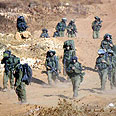
Winograd: IDF put troops' safety over operational needs
Official probe into Second Lebanon War determines army went into battle unprepared, was incapable of adjusting operations to political necessities and employed incorrect strategic thinking. Committee says there is also room for individual responsibility
"We found serious failings and flaws in the quality of preparedness, decision-making and performance in the IDF high command, particularly within the ground forces," the Winograd Commission concluded in its final report on Israel's conduct during the Second Lebanon War.
The long-awaited report minced no words with the army, laying most of the blame for the unsatisfactory outcome of the war on the IDF's shoulders while largely absolving the political echelon of culpability.
''The overall image of the war was a result of a mixture of flawed conduct of the political and military leadership ... of flawed performance by the military, especially the ground forces, and of deficient Israeli preparedness,'' Winograd said. ''We found serious failings and flaws in the lack of strategic thinking and planning.''
"The IDF operated during the war with the fear of casualties among its troops providing a key factor in its decisions and considerations," said the committee, adding that the army's most fundamental values were compromised during the war.
The report asserts that the military's operational conceptualization was lacking and said the IDF spent most of the war conducting routine security operations. "This sense of maintaining routine security also had to do with the tendency to place the safety of the troops over carrying out combat missions in accordance with the schedule," the committee wrote.
"Often times there was a genuine contradiction between the objective – gaining control, conquering – and the limitations placed on the troops. The military commands' authorization of divisional operations were rife with restrictions and limitations. The General Staff failed to communicate to the political echelon that this manner of conduct is unsuitable for war."
Dangerous to think of Air Force as 'miracle solution'
The committee commends the Air Force for its accomplishments and notes that its meticulous forward planning allowed it to successfully take out Hizbullah's long and medium-range rocket arrays. However, the committee notes, the IAF failed to exact the necessary amount of damage against the organization's short-range rockets in a way that would significantly decrease the attacks on northern Israel.
The committee also said that the Air Force's availability to evacuate wounded soldiers from the battlefield disguised the ground forces' ineptitude in that area.
The Air Force should not be thought of as a "miracle solution," warned the committee. "Particularly we must refrain from disproportionate expectations in a confrontation with a well-prepared guerilla enemy."
'Errors do not happen on their own'
The committee defended its decision not to single out key figures and hold them individually responsible: "There is an almost natural assumption that where there are grave deficiencies – even though they are part of complex systems which are also worthy of merit – there is room for 'individual responsibility.'
"We accept this assumption. Failings, deficiencies and errors do not come into being on their own. We believe that accountability, which entails both individuals taking responsibility themselves and the casting of responsibility where it is necessary, are part of a proper normative system."










